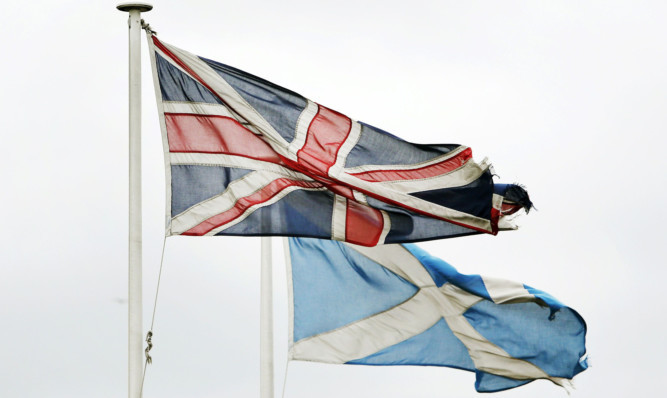
THE future of the Union is “under threat” as a result of “piecemeal” devolution to the nations that make up the United Kingdom, a Lords committee has warned.
Successive UK governments have taken the Union between England, Scotland, Wales and Northern Ireland “for granted”, a report from the House of Lords Constitution Committee said.
It has now called on ministers to “focus more on the Union” and the overall impact different pieces of devolution legislation have had.
Committee chair and former Tory Scottish secretary Lord Lang of Monkton said: “We must stop taking the Union for granted. Since 1999, devolution has been largely demand-led and piecemeal. The committee saw no evidence of strategic thinking about its cumulative impact on the Union as a whole.
“The Government does not seem to recognise the pressures being placed on the United Kingdom by the ad hoc, reactive manner in which devolution has taken place, and continues to take place. It’s now time to focus more on the Union.”
The committee report said: “We believe that the four nations of England, Northern Ireland, Scotland and Wales are stronger united than apart. The Union has brought stability, peace and prosperity to the United Kingdom. Yet today, the Union is under threat.”
It said power had been transferred to assemblies in Scotland, Wales and Northern Ireland in “an ad hoc, piecemeal fashion”, without “proper consideration of the cumulative impact of devolution on the integrity of the Union”.
The report warned this “inattentive approach to the integrity of the Union cannot continue”, with the Lords calling for any further plans to transfer power out of Westminster to be “considered within an appropriate framework of constitutional principles that safeguard the integrity of the Union”.
In future, a “Devolution Impact Assessment” could be published, examining the potential impact of proposals on the “cohesiveness and stability of the Union as a whole, and on each of its constituent nations”.
Ministers have also been urged to adopt a new approach to devolution, with the report saying: “A new mindset is required at all levels of government – one that recognises the devolved institutions as now being established components of the UK’s constitution.
“This new mindset will require abandoning a ‘devolve and forget’ attitude. Instead, the UK Government should engage with the devolved institutions across the whole breadth of government policy, co-operating and collaborating where possible. In particular, the Joint Ministerial Committee should be reformed to promote co-operation and collaboration, rather than grandstanding and gesture politics.”
Lord Lang, who served as Scottish secretary under John Major, said: “UK governments have failed to adapt to devolution. We urgently need ‘a new mindset’ within government. Devolved competencies now cover so many areas of public responsibility that the delivery of government policies often requires collaboration between the UK and devolved governments. This is not yet being done effectively.
“Shared and overlapping policy areas need to be handled sensibly, with each administration conscious of the interests of the others.”
The Lords also called for the Barnett Formula, used to distribute funding between different parts of the UK, to be scrapped in favour of a new needs-based system.
“In our view, to perpetuate the use of the Barnett Formula, which takes no account of relative need, makes a mockery of the Government’s duty to ensure a fair distribution of resources across the UK,” the report said.
“We recommend that the UK Government reconsider its use of the inadequate Barnett Formula and establish a mechanism that takes into account the relative needs of different nations and regions in allocating funds.”
With constitutional politics reserved to Westminster, the Lords said any future votes on independence “should be set out in primary legislation by the UK Parliament”, arguing this will allow for “proper scrutiny by representatives of all four nations”.
Meanwhile they said it is “too soon to know” if English Votes for English Laws (Evel) and “devolution deals” – where local authorities are given greater power – will provide an answer to the “English question”, which has left the largest part of the UK as the only part without its own assembly.
“What is clear is that the English question remains one of the unresolved issues facing decision-makers grappling with the UK’s territorial constitution,” the report said.
READ MORE
Henry McLeish urges referendum on ‘new alternative of real home rule’
Nicola Sturgeon insists independence ambition ‘rooted in democracy’

Enjoy the convenience of having The Sunday Post delivered as a digital ePaper straight to your smartphone, tablet or computer.
Subscribe for only £5.49 a month and enjoy all the benefits of the printed paper as a digital replica.
Subscribe